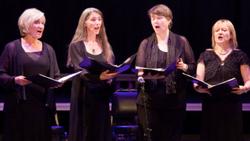A&E
Anonymous 4 & Bruce Molsky bring back music of the Civil War era
By Alexa Merriam ’17
March 6, 2015
150 years ago, on April 9, 1865, Confederate General Robert E. Lee surrendered to Union Civil War General-in-Chief Ulysses S. Grant in Appomattox, Virginia. This event signified the beginning of the end of the bloodiest four years in American history. Anonymous 4 (who jokingly revealed their identities due to “frequent complaints” over the years) joined by renowned old-time fiddler, master banjo and guitar player and singer Bruce Molsky, commemorated the anniversary of the end of the American Civil War and the abolition of slavery with a spirited and varied collection of songs entitled 1865: Songs of Hope and Home from the American Civil War.
On Saturday, Feb. 28, Wellin Hall guests were treated to nearly 20 songs from “1865,” Anonymous 4 and Bruce Molsky’s latest project. All of the songs in the show were written and/or performed during the nineteenth-century Civil War era. The demand for music was especially high during the war years, and the music and lyrics of the songs in 1865 reflect the personal experiences of men, women and children from the years 1861-1865 and in the aftermath of reconstruction following the war. Songs were performed for a variety of occasions—for homesick soldiers on the battlefield, in parlors throughout the North and South, as well as for consolation in the back roads of America.
It was delightful to see how much the audience enjoyed listening to a genre of music that is rarely performed these days. Anonymous 4, comprised of Ruth Cunningham, Marsha Genesky, Susan Hellauer and Jacqueline Horner-Kwiatek, opened the show with a gorgeous a cappella arrangement of “Weeping, Sad and Lonely (When this Cruel War is Over),” and Bruce Molsky’s voice added a vibrant fifth layer to the sound when he joined in for the middle verses. The program proceeded to alternate between songs with words accompanied by a guitar, fiddle or banjo and Molsky’s solo instrumental performances. It was clear after hearing the four ladies sing and Molsky’s talent with strings that the performers were masters of their craft as well as the music itself.
Bruce Molsky is lauded throughout the old-time music community as one of the greatest fiddlers in the country. He showcased his banjo and fiddle playing talent on songs “Bright Sunny South,” “Rebel Raid,” “Camp Chase” and “Polly Put the Kettle On.”
Anonymous 4 had a playful way of announcing some of their songs, completing one another’s sentences with smiles and giggles, making for a light-hearted, fun event to watch. Since gathering to sing medieval chant polyphony together in the spring of 1986, the four women have formed an unbreakable bond that was demonstrated on the stage. One of the singers asked another, “And where did you first hear this song?” The lady next to her said, “on the ‘The Three Stooges!’” And the lady next to her said, “And what is the title of this song?” And the lady next to her said, “You’ll find out (we say it a lot!).” The four ladies broke out in “Listen to the Mockingbird,” which, despite its sad lyrics, has become widespread as a comical song.
As someone not well versed in the American treasury of Civil War music, I was surprised to have recognized some of the songs included in the program. “Aura Lee,” sung with two voices and a guitar, was the source melody for Elvis Presley’s famous “Love Me Tender.” I also had no idea that “The True Lover’s Farewell” had its origins as a lonesome sounding folk song from the mid-nineteenth century. One of the most fascinating songs of the evening was “Home, Sweet Home,” a song arranged for banjo and five singing voices, taken from the 1823 opera Clari, or the Maid of Milan. “Home, Sweet Home” remained the most popular song of the Civil War era in both the North and South. Though certain songs were favored in either region, by the end of the war, music publishers and printers eventually set allegiances aside, and music touched the hearts of soldiers and civilians no matter with which side of the war it was associated. Music of the Civil War era is not only pleasurable and relevant in the United States, but songs such as “Shall We Gather at the River” have grown popular in Great Britain as well.
Attending the Anonymous 4 and Bruce Molsky concert this past weekend was a true glimpse into the untold stories of American history. This wonderful folk music was the perfect way to recognize the 150th anniversary of the end of the Civil War and the abolition of slavery.
Keep your eyes and ears peeled for more great appearances in Wellin Hall as part of the Spring 2015 performing arts season.





